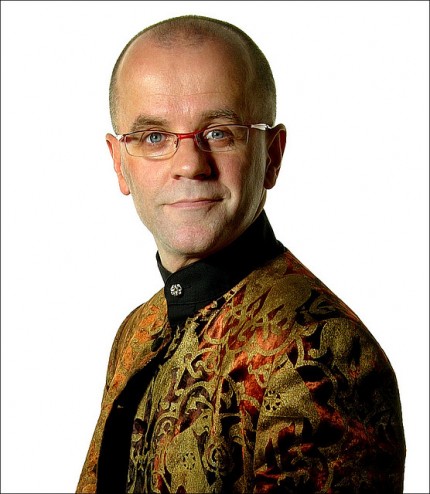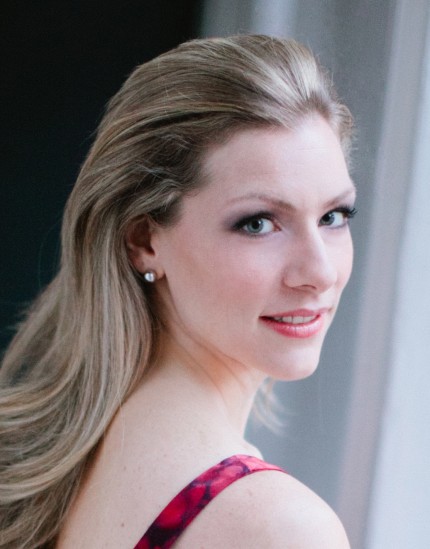Soloists, Grant Park Chorus soar in Rossini’s “Stabat Mater”

The horrific news coming out of Colorado on Friday lent an unexpected weight and timely gravitas to the evening’s performance of Rossini’s Stabat Mater at the Grant Park Music Festival. Indeed, the Latin text reflecting the suffering of Mary, Jesus’s mother, at the foot of the cross, could hardly have been more apt in light of the tragic event.
Rossini wrote his setting on commission after his early retirement, yet the famously indolent composer failed to finish it, hiring a student to write the unfinished sections for its premiere. Rossini returned to the Stabat Mater a few years later, belatedly completing the work in the form in which it is known today.
Rossini’s Stabat Mater is not a masterpiece on the level of the requiems of Verdi or Mozart, works in which the other composers traverse the lines between the opera stage and the sacred much more convincingly. Still, there is much inspired music in Rossini’s Stabat Mater even if the piece ultimately remains something less than the sum of its constituent parts.
One is unlikely to hear finer advocacy of this work than that served up Friday night at the Pritzker Pavilion by conductor Christopher Bell and the Grant Park Orchestra and Chorus. While the chorus has essential moments, the focus in this work is centered on the four soloists and it was this terrific lineup of singers that — individually and collectively — really lifted the performance out of the ordinary.
René Barbera, now in his third and final season with the Lyric Opera’s Ryan Opera Center, provided first-class vocalism throughout. Rossini’s melody for the Cujus animam gementem is a strangely jaunty tune considering the tragic text, yet Barbera delivered the aria with a ripe and vibrant tenor and an easily produced high D flat. Don’t miss his major-role debut at Lyric this fall as Ernesto in Don Pasquale.
Jonita Lattimore didn’t sound entirely at ease with the rapid coloratura of Inflammatus et accensus but otherwise here and elsewhere the soprano sang with bright tone, fine clarity and ringing top notes.

Jennifer Holloway and Ryan McKinney both made highly impressive festival debuts. Holloway conveyed the mournful spirituality of the work most poignantly of all. She blended gratefully with Lattimore in the duet, Quis est homo, and showed a rich and refulgent mezzo in an expressive account of the cavatina, Fac ut portem Christi mortem.
McKinney’s dark, saturnine bass brought a Mephistophelian quality to the dramatic moments yet he displayed surprising delicacy as well — as did the chorus — in the a cappella Eja Mater, fons amoris.
The Grant Park Chorus were at their considerable finest under the baton of their chorus director, singing with superb clarity, tonal refinement and dramatic power. Bell’s direction was first-class throughout. The conductor-chorus master brought out the variety, melodic richness, and rhythmic subtlety of the score with alert detailing and put across the big moments without inflating the work’s dimensions.
The first half of the concert offered more Rossini alongside a rarity by Kenneth Leighton.
The evening led off with the Overture to William Tell. Bell led the Grant Park Orchestra in a richly layered rendering of the populist curtain-raiser with lovingly burnished cello playing in the introduction by principal Walter Haman and colleagues, who well earned a collective bow. Judith Kulb contributed an evocative Alpine-like English horn solo and the performance was rounded off with a suitably rousing coda, Bell emphasizing transparency and clear articulation rather than speed and bombast in the galloping final section.
The Stabat Mater was nicely prefaced by a festival premiere, the Hymn to Matter by Kenneth Leighton. The English composer (1929-88) sets a text by Pierre Teilhard de Chardin, the influential French priest and philosopher, whose experience as an ambulance worker at Verdun had a crucial effect on his writings and outlook.
Scored for chorus, bass soloist and orchestra (strings, percussion, piano and timpani), the Hymn to Matter is a somber and effective work imbuing its scientifically informed spirituality with a 20th-century edge. Leighton is largely unknown in the U.S., and Bell gave his teacher’s music strong advocacy. Bell led a well-prepared performance that elicited powerful singing by the Grant Park Chorus with Ryan McKinney lending stentorian vocalism in the declamatory solo part.
The program will be repeated 7:30 p.m. Saturday. grantparkmusicfestival.com
Posted in Performances




